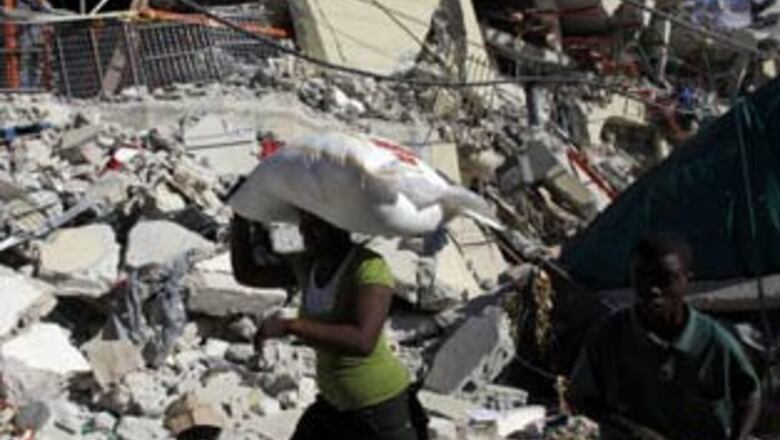
views
Port-au-Prince: Thousands of people injured in Haiti's massive earthquake spent a third night twisted in pain, lying on sidewalks and waiting for help as their despair turned to anger.
"We've been out here waiting for three days and three nights but nothing has been done for us, not even a word of encouragement from the president," said Pierre Jackson, nursing his mother and sister who lay whimpering with crushed legs.
"What should we do?"
Desperate Haitians blocked streets with corpses in one part of Port-au-Prince to demand quicker relief efforts following Tuesday's catastrophic quake, which flattened buildings and killed tens of thousands, leaving countless others homeless.
Bodies lay all around the hilly city, and people covered their noses with cloth to block the stench of death. Corpses were piled on pickup trucks and delivered to the General Hospital in Port-au-Prince, where hospital director Guy LaRoche estimated the bodies piled outside the morgue numbered 1,500.
More than 48 hours after disaster struck, masses of people clamoured for food and water, as well as help in digging out relatives still missing under the rubble.
Shaul Schwarz, a photographer for TIME magazine, said he saw at least two downtown roadblocks formed with bodies of earthquake victims and rocks.
"They are starting to block the roads with bodies. It's getting ugly out there. People are fed up with getting no help," he told Reuters.
The United Nations was due to launch an emergency appeal for funding for Haiti on Friday.
Angry survivors staged the protest as international aid committed by 30 countries began arriving in Port-au-Prince in dozens of planes that clogged the city's small airport.
US forces were continuing trying to step up operations at the airport in order to get more supplies and workers into the country.
The Haitian Red Cross said it believed 45,000 to 50,000 people had died and 3 million more - one third of Haiti's population - were hurt or left homeless by the major 7.0 magnitude quake that hit its impoverished capital on Tuesday.
"We have already buried 7,000 in a mass grave," President Rene Preval said.
The Haitian Red Cross said it had run out of body bags.
Doctors in Haiti, the poorest country in the Western Hemisphere, were ill-equipped to treat the injured.
Relief workers warned that many more people will die if the injured, many with broken bones and serious loss of blood, do not get first aid in the next day or so.
PAGE_BREAK
"The next 24 hours will be critical," said U.S. Coast Guard officer Paul Cormier, 54, a qualified emergency worker who has triaged 300 people since Tuesday.
Aid bottleneck
Planes full of supplies and search and rescue equipment began to arrive at Port-au-Prince airport on Thursday faster than ground crews could unload them, jamming the limited ramp space and forcing arriving aircraft to circle for up to two hours before landing.
US President Barack Obama pledged an initial $100 million for Haiti quake relief on Thursday and enlisted former US presidents Bill Clinton and George W Bush to help raise more, vowing to the Haitian people: "You will not be forsaken."
The United States was sending 3,500 soldiers, 300 medical personnel, several ships and 2,200 Marines to Haiti.
The US Navy said its nuclear-powered aircraft carrier USS Carl Vinson will arrive on Friday to serve as a "floating airport" for relief operations by its 19 helicopters.
The United States pledged long-term help for the crippled Haitian government.
The presidential palace, Parliament, the cathedral and many government buildings collapsed. The main prison also fell, allowing dangerous criminals to escape.
Nations around the world pitched in to send rescue teams with search dogs and heavy equipment, helicopters, tents, water purification units, food, doctors and telecoms teams.
But aid distribution was hampered because roads were blocked by rubble and smashed cars and normal communications were cut off.
Relief agencies' offices were damaged and their staff dead or missing. The port was too badly damaged to handle cargo.
Many hospitals were too battered to use, and doctors struggled to treat crushed limbs, head wounds and broken bones at makeshift facilities where medical supplies were scarce.
Makeshift tents were strung everywhere and Haitians at one informal camp approached journalists shouting "water, water."
"Please do anything you can. These people have no water, no food, no medicine, nobody is helping us," said Valery Louis, who organised one of the camps.
Haitians clawed at chunks of concrete with bare hands and hammers, trying to free those buried alive. From time to time, aftershocks shook the city, sending panicked people running away from buildings.
A 35-year-old Estonian, Tarmo Joveer, was freed from the rubble of the United Nations' five-story headquarters early Thursday, and told journalists he was fine.
The UN said at least 36 members of its 9,000-strong peacekeeping mission had been killed and scores remained missing. Brazil said 14 of its soldiers were among the dead.
Fourteen people were pulled alive on Thursday from the landmark Montana Hotel, which was largely flattened. Chilean Army Major Rodrigo Vazquez, who was directing the rescue, said: "We estimate 70 more inside. This is devastating."




















Comments
0 comment